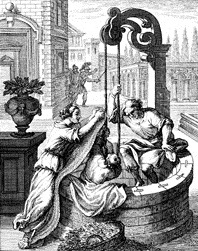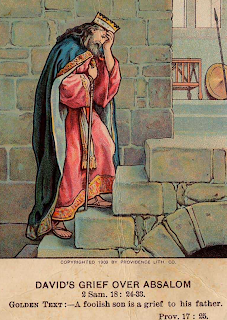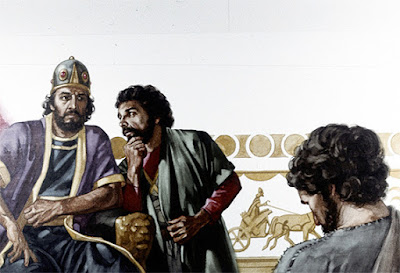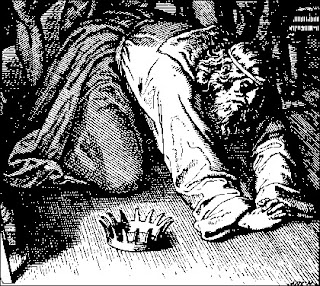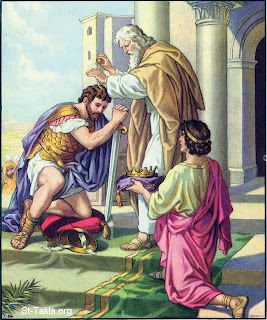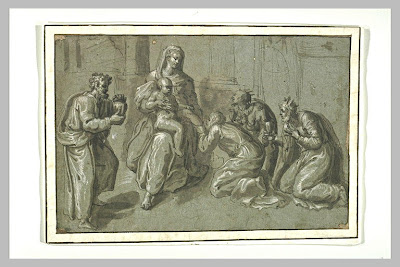 |
| "Adoration of the Magi" after Workshop of Raphael |
TODAY'S SPECIAL: 2 Samuel 7:1-17
TO CHEW ON: "And your house and your kingdom shall be established forever before you. Your throne shall be established forever." 2 Samuel 7:16
What does a passage in 2 Samuel have to do with Christmas, you may be asking. As we read it we see, sure enough. Here in Nathan's prophecy to David is a very clear reference to Messiah. Of 2 Samuel 7:12-16 a footnote in my Bible says:
"The son of David (Solomon) and the son of David (the Messiah) merge here. It is the Messiah's throne that will be established forever" - Jerry Cook, New Spirit Filled Life Bible, p. 411.
Then the footnote suggests more Bible bits to read in the same vein. Let's read and ponder them, letting the prophetic words of hope and longing crane the necks of our spirits and lift our eyes as we anticipate the celebration of His birth and the revelation of His Kingdom established still to come.
Psalm 45. Note especially verse Psalm 45:6:
"Your throne, O God, will last for ever and ever;
a scepter of justice will be the scepter of your kingdom." - NIV © 2010
Psalm 2: 6-9:
6"Yet have I anointed (installed and placed) My King [firmly] on My holy hill of Zion.
7I will declare the decree of the Lord: He said to Me, You are My Son; this day [I declare] I have begotten You.
8Ask of Me, and I will give You the nations as Your inheritance, and the uttermost parts of the earth as Your possession.
9You shall break them with a rod of iron; You shall dash them in pieces like potters' ware." - Amplified
Psalm 89:3-4
3 "The Lord said, “I have made a covenant with David, my chosen servant.
I have sworn this oath to him:
4 ‘I will establish your descendants as kings forever;
they will sit on your throne from now until eternity.’”
Interlude" - NLT
Hebrews 1:8
8 "But to the Son He says:Revelation 11:15
'Your throne, O God, is forever and ever;
A scepter of righteousness is the scepter of Your kingdom.'"- NKJV
15 "The seventh angel sounded his trumpet, and there were loud voices in heaven, which said:
'The kingdom of the world has become
the kingdom of our Lord and of his Messiah,
and he will reign for ever and ever.'" - NIV © 2010
Revelation 19:6
"6After that I heard what sounded like the shout of a vast throng, like the boom of many pounding waves, and like the roar of terrific and mighty peals of thunder, exclaiming, 'Hallelujah (praise the Lord)! For now the Lord our God the Omnipotent (the All-Ruler) reigns!'" - Amplified
PRAYER: Dear God thank You for Your kingdom, predicted by the prophets, fulfilled in the coming of Christ and still in the process of being revealed. I look forward to the day when Your complete victory over Satan, sin and death is visible. Amen.
MORE: "Of the Father's Love Begotten"
"All dominions bow before Him
And extol our God and King"
********************
Unless otherwise noted all Scripture quotations are taken from the New King James Version®. Copyright © 1982 by Thomas Nelson, Inc. Used by permission. All rights reserved.
Scripture quotations marked AMP are taken from the Amplified® Bible, Copyright © 1954, 1958, 1962, 1964, 1965, 1987 by The Lockman Foundation. Used by permission." (www.Lockman.org)
Scripture quotations marked NLT are taken from the Holy Bible, New Living Translation, copyright © 1996, 2004, 2007 by Tyndale House Foundation. Used by permission of Tyndale House Publishers, Inc., Carol Stream, Illinois 60188. All rights reserved
Scripture quotations marked NIV are taken from THE HOLY BIBLE, NEW INTERNATIONAL VERSION®, NIV® Copyright © 1973, 1978, 1984, 2011 by Biblica, Inc.® Used by permission. All rights reserved worldwide.

